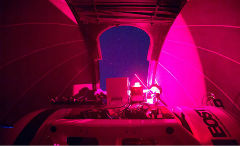Scientists create first photon quantum computer
2017-05-04
China Daily
China has created the world’s first photon quantum computer, which is expected by 2020 to work at speeds that eclipse the most powerful supercomputer, scientists said.
The device, called a boson-sampling machine, is 10 to 100 times faster than electronic and transistor computers, which were developed in the mid-20th century, and is 24,000 times faster than experimental quantum devices developed in other countries, said Pan Jianwei, an academician at the Chinese Academy of Sciences and the leading quantum physicist involved in building the machine.
One analogy to explain the speed of quantum computing is like being able to read all the entries in a phone book at the same time, while conventional computers, even supercomputers, have to read entries one by one.
“A quantum computer can solve problems that have septillion (1 followed by 24 zeros) variables in a matter of seconds, while even today’s most powerful supercomputer would take centuries,” Pan said.
However, the current model only uses five photon qubits-subatomic light particles that store data-so its calculation ability is less than that of a modern cellphone. But Pan said with 50 qubits, which will be achieved by 2020, its speed in solving these problems could surpass the fastest supercomputer.
By the end of this year, Pan said he will scale up his machine to have 20 qubits, which would be more powerful in solving complex problems than the fastest laptop on the market.
He also plans to open the machine’s cloud computing platform to public use, according to his team’s studies, published on May 2 in Nature Photonics, an international science journal.
Quantum computers, however, will not replace personal desktops at home, Pan said. For simple tasks like internet browsing, “the quantum computer’s power is mostly wasted and therefore has no noticeable edge compared with already highly advanced PCs”, he said.
Today’s most advanced quantum computers use around five qubits, which may sound underwhelming. But 100 qubits can do around 1.3 nonillion (1 followed by 30 zeros) calculations-over 10 quadrillion times larger than the global GDP in 2014.
Quantum computers also use a fraction of the energy that supercomputers use because only a few dozen qubits are required to unleash enormous computing powers, Zhu said. In addition, Chinese scientists have discovered new, energy efficient ways to keep the computer at temperatures needed to operate, further reducing costs.
Due to the potential of quantum computing, the United States, the United Kingdom and other European nations are in a race for quantum supremacy.
High-tech companies, such as IBM, Google, Microsoft and Intel, also are developing quantum computers using different subatomic particles, such as electronics or superconducting elements.
What makes China’s photon quantum computer special is its resistance to interference and ability to scale up, said Lu Chaoyang, a quantum physicist at the University of Science and Technology of China.
“Unlike electrons or protons found in other quantum computers, photons do not generally react with the environment, so photon quantum computers are more stable,” he said.
“China is also the world leader in optics technology, so we have the resources and expertise to quickly increase the size of our computers.”
Apart from increasing the hardware, Chinese scientists also are developing software and a new programming language to fully utilize the power of quantum computing, he added.


